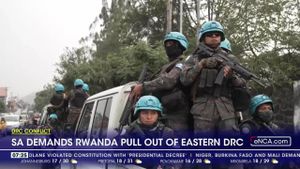SAN SALVADOR, El Salvador — The Trump administration is currently engaged in negotiations with El Salvador, aimed at reviving a longstanding agreement concerning the transfer of non-Salvadoran migrants, including members of the Venezuelan gang known as Tren de Aragua, to Salvadoran prisons. Despite the controversies surrounding human rights and democratic governance, these talks, highlighted by high-ranking officials, mark another chapter in U.S. immigration policy under the previous administration.
According to Mauricio Claver-Carone, the U.S. State Department’s special envoy for Latin America, the discussions aim to bolster the efforts of El Salvador’s government, which has been on the front lines of addressing gang violence. This latest initiative is seen as part of the broader strategy by the Trump administration to streamline deportations and respond effectively to rising gang activity, particularly from Venezuelan groups.
El Salvador's President Nayib Bukele gained international attention for his hardline approach to tackling gang violence. Last year, Bukele suspended key constitutional rights, leading to the arrest of approximately 84,000 people, which is more than 1% of the country’s population. The fallout from this crackdown has led to significant human rights criticism, yet Bukele's actions have correspondingly contributed to a dramatic decline in violence, eliciting admiration from certain quarters within American right-wing circles.
"If we commit to reviving this agreement and include ... members of the Tren de Aragua gang, I bet they're going to want to go back to Venezuela instead of dealing with the Mara prisons in El Salvador," remarked Claver-Carone during discussions about the negotiations. His comments reflect the administration's strategy of leveraging deportation agreements to address its domestic and foreign policy objectives.
Claver-Carone’s remarks preceded Secretary of State Marco Rubio's imminent visit to Latin America, which includes stops in El Salvador, Panama, Guatemala, Costa Rica, and the Dominican Republic to discuss migration matters. It is reportedly expected of Rubio to advocate for more cooperation from regional leaders to aid the U.S. administration's stringent immigration policies. This outreach will focus on encouraging countries like El Salvador to accept deported migrants from nations such as Venezuela, Nicaragua, and Cuba, which have been resistant to U.S. deportation efforts.
The Trump administration's discussions come on the heels of previous initiatives like the "Safe Third Countries" program introduced back in 2019, which sought to reshape the migration framework within Central America amid rising numbers of asylum seekers heading to the U.S. Such earlier attempts to negotiate similar arrangements were intended to deter migration by shifting some responsibilities back to origin countries.
Despite these efforts, implementation has often faced hurdles, including the lack of cooperation from Central American leaders and the inherent complications related to human rights practices. Given the increasing pressure on U.S. borders due to migrant influx and renewed concerns about security posed by gangs, this revitalized engagement with El Salvador indicates the Trump administration's commitment to aggressive immigration enforcement.
While Bukele's firm approach has found applause from certain U.S. politicians, critics argue it poses significant risks to civil rights and the rule of law. Critics also worry about the psychological and physical conditions these deportees may face within Salvadoran prisons, which have been characterized by overcrowding and harsh environments.
El Salvador has long struggled with gang-related violence, with notorious groups like MS-13 and Barrio 18 dominating the streets. Under Bukele, the government's brutal crackdown against these gangs has led to mixed outcomes — significantly reduced crime rates on one hand, but also heightened scrutiny from human rights advocates concerned with the methods employed to achieve such results.
These complex dynamics present both opportunities and risks as the Trump administration maneuvers to implement migration strategies affecting thousands of lives. The prospective success of the current negotiations hinges not only on the cooperation between the U.S. and El Salvador but also on the broader shifts occurring within the geopolitical climate of Central America.
With Secretary Rubio's trip imminent, eyes will be on how these discussions evolve and what they might mean for the future of U.S. migration policies and regional relationships. The initial optimism surrounding these negotiations could soon face tests as various stakeholders voice their hopes and fears about the impact of sending gang members back to confront established Salvadoran criminal networks.



